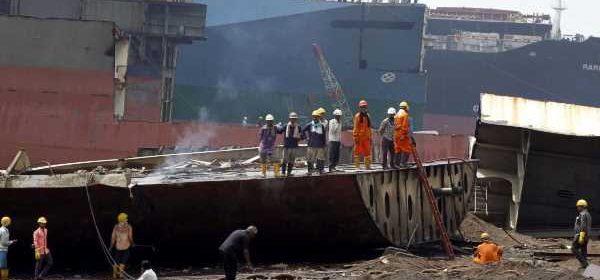Worker’s death casts grim shadow over Alang recycling industry

The industry has protested the police case and notice over the death, and requested Chief Minister Bhupendra Patel to ensure a fair investigation to avoid hurting the industry’s image.
The ship recycling industry in Alang, Gujarat, fears for its global image as a worker’s “accidental” death — the first in decades — has prompted the police to file a case of negligence.
The worker died on June 3 when a steel plate cut from a vessel fell on him. The police filed a case against the plot owner, manager and safety officer, and the Gujarat Maritime Board (GMB) later issued a closure notice to the business where the worker died.
The industry protested the police case and notice, requesting Chief Minister Bhupendra Patel to ensure a fair investigation to avoid hurting the industry’s image.
“Already, as India’s largest ship recycling yard, Alang has been facing tough competition from the likes of Turkey, Bangladesh and Pakistan which are offering better prices for vessels to international customers. As against an ideal 45-50 vessels a month, we are getting less than 20 vessels. In such a scenario, the police have not conducted proper investigation and have filed a case of death by negligence when it is an accident,” said Mukesh Patel, chairman of the Shree Ram Group, at whose partner unit the death occurred.
“The plate had just been cut and was awaiting to be lifted by the crane. Shop floor norms mandate that after cutting the plate, workers should step away from it. Instead, the worker went towards the plate and went behind to relieve himself when it fell on him due to a gust of wind,” Patel said.
Alang’s Ship Recycling Industries Association said the industry works as per the regulations of the Ship Recycling Code 2013 (revised) and Factory Act.
“The Ship Recycling Code, which was brought out by the government, mandates only five days of plot closure for investigation in case of death or mishap. However, GMB has issued a closure for 30-40 days. This will not only leave labourers at the unit without work and wages during this period but also impact the industry’s international image among customers,” said Vishnu Gupta, president of the association.
The industry follows the Hong Kong Convention to ensure international business viability, said Gupta. The convention for the safe and environmentally sound recycling of ships was adopted by India and other nations in 2009. It was developed with inputs from International Maritime Organisation (IMO) member countries as well as Basel Convention on hazardous waste, of which India is a party.
Gupta said that the Rajasthan government had decided not to declare a 2019 accident at a factory as ‘culpable homicide’ without conducting proper investigation. “Being an industry friendly state, Gujarat should follow suit and not term accidental deaths as homicide,” he said.
The industry in Alang says it is becoming uncompetitive against Turkey and Bangladesh, which offer around $200 to vessel owners for ship breaking and recycling as against India’s price of around $600. The Alang industry’s annual vessel handling capabilities, measured in terms of light displacement tonnage (ldt), has fallen from 1.5 million ldt to 500,000-700,000 ldt in recent times, according to industry estimates.
Source: Read Full Article

